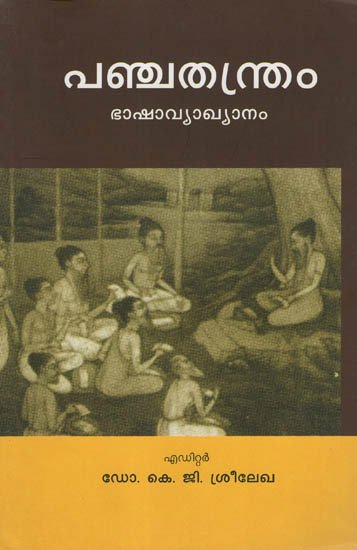Panchatantra [sanskrit]
by Dr. Naveen Kumar Jha | 2016 | 13,828 words | ISBN-13: 9788193077962
The Sanskrit edition of the Panchatantra referencing the English translation and grammatical analysis. Written by Vishnu Sharma and possibly dating as early as 1200 BCE, the Panchatantra (or Pancatantra) represents a collection of short stories teaching basic ethical values and moral conduct that was commonly practiced in ancient Indian. Alternative titles: Śrīviṣṇuśarman Pañcatantra (श्रीविष्णुशर्मन् पञ्चतन्त्र, Śrī-viṣṇuśarman pancatantra, श्री-विष्णुशर्मन्, Sri-visnusarman)
Verse 1.81
कनक-भूषण-सङ्ग्रहणोचितो यदि मणिस् त्रपुणि प्रतिबध्यते ।
न स विरौति न चापि स शोभते भवति योजयितुर् वचनीयता ॥ ८१ ॥
kanaka-bhūṣaṇa-saṅgrahaṇocito yadi maṇis trapuṇi pratibadhyate |
na sa virauti na cāpi sa śobhate bhavati yojayitur vacanīyatā || 81 ||
The English translation of Panchatantra Verse 1.81 is contained in the book The Complete Pancatantra: Sanskrit Text with English Translation by Dr. Naveen Kumar Jha. This book is not available online so in order to read the full text and translation you should buy the book:
Buy now! English translation by Dr. Naveen Kumar Jha (2016)
Glossary of Sanskrit terms
Note: This extracts Sanskrit terms and links to English definitions from the glossary, based on an experimental segmentation of verse (1.81). Some terms could be superfluous while some might not be mentioned. Click on the word to show English definitions.
Kanaka, Bhushana, Sangrahana, Ucita, Yadi, Yad, Mani, Trapu, Pratibadhya, Tad, Yushmad, Vira, Viri, Capin, Capi, Shobhat, Bhavati, Bhavat, Bhavant, Yojayitri, Vacaniyata,
Analysis of Sanskrit grammar
Note: this is an experimental feature and only shows the first possible analysis of the Sanskrit text (Panchatantra Verse 1.81). If the system was successful in segmenting the sentence, you will see of which words it is made up of, generally consisting of Nouns, Pronouns, Verbs, Participles and Indeclinables. Click on the link to show all possible derivations of the word.
- Line 1: “kanaka-bhūṣaṇa-saṅgrahaṇocito yadi maṇis trapuṇi pratibadhyate ”
- kanaka -
-
kanaka (noun, masculine)[compound], [vocative single]kanaka (noun, neuter)[compound], [vocative single]
- bhūṣaṇa -
-
bhūṣaṇa (noun, masculine)[compound], [vocative single]bhūṣaṇa (noun, neuter)[compound], [vocative single]
- saṅgrahaṇo -
-
saṅgrahaṇa (noun, masculine)[compound], [vocative single]saṅgrahaṇa (noun, neuter)[compound], [vocative single]
- ucito* -
-
ucita (noun, masculine)[nominative single]√uc -> ucita (participle, masculine)[nominative single from √uc class 4 verb]
- yadi -
-
yadi (indeclinable conjunction)[indeclinable conjunction]yadi (indeclinable relative)[indeclinable relative]yadi (indeclinable)[indeclinable]yad (noun, masculine)[locative single]
- maṇis -
-
maṇi (noun, masculine)[nominative single]
- trapuṇi -
-
trapu (noun, neuter)[locative single]
- pratibadhya -
-
pratibadhya (noun, masculine)[compound], [vocative single]pratibadhya (noun, neuter)[compound], [vocative single]
- te -
-
ta (noun, masculine)[locative single]ta (noun, neuter)[nominative dual], [vocative dual], [accusative dual], [locative single]tā (noun, feminine)[nominative dual], [vocative single], [vocative dual], [accusative dual]tad (noun, neuter)[nominative dual], [accusative dual]sa (noun, masculine)[nominative plural]sā (noun, feminine)[nominative dual], [accusative dual]yuṣmad (pronoun, none)[dative single], [genitive single]
- Line 2: “na sa virauti na cāpi sa śobhate bhavati yojayitur vacanīyatā ”
- na -
-
na (indeclinable particle)[indeclinable particle]na (noun, masculine)[compound], [vocative single]na (noun, neuter)[compound], [vocative single]
- sa -
-
sa (noun, neuter)[compound], [vocative single]sa (noun, masculine)[nominative single]
- virau -
-
vira (noun, masculine)[compound], [nominative dual], [vocative single], [vocative dual], [accusative dual]vira (noun, neuter)[compound], [vocative single]virā (noun, feminine)[nominative single]viri (noun, masculine)[locative single]
- auti -
-
√u (verb class 2)[present active third single]
- na -
-
na (indeclinable particle)[indeclinable particle]na (noun, masculine)[compound], [vocative single]na (noun, neuter)[compound], [vocative single]
- cāpi -
-
cāpin (noun, masculine)[compound], [adverb]cāpin (noun, neuter)[compound], [adverb], [nominative single], [vocative single], [accusative single]cāpī (noun, masculine)[compound], [adverb]cāpī (noun, feminine)[compound], [adverb], [vocative single]cāpī (noun, neuter)[compound], [adverb], [nominative single], [vocative single], [accusative single]cāpi (noun, masculine)[compound], [adverb]cāpi (noun, feminine)[compound], [adverb]cāpi (noun, neuter)[compound], [adverb], [nominative single], [vocative single], [accusative single]
- sa -
-
sa (noun, neuter)[compound], [vocative single]sa (noun, masculine)[nominative single]
- śobhate -
-
√śubh -> śobhat (participle, masculine)[dative single from √śubh class 1 verb]√śubh -> śobhat (participle, neuter)[dative single from √śubh class 1 verb]√śubh (verb class 1)[present middle third single]
- bhavati -
-
bhavatī (noun, feminine)[adverb], [vocative single]bhavat (noun, masculine)[locative single]bhavat (noun, neuter)[locative single]bhavant (pronoun, masculine)[locative single]bhavant (pronoun, neuter)[locative single]√bhū (verb class 1)[present active third single]
- yojayitur -
-
yojayitṛ (noun, masculine)[ablative single], [genitive single]
- vacanīyatā -
-
vacanīyatā (noun, feminine)[nominative single]
Other editions:
Also see the following editions of the Sanskrit text or (alternative) English translations of the Panchatantra Verse 1.81
Pancatantra of Visnusarman
by M. R. Kale (2015)
Panchatantra in Simple Sanskrit
by Dr. Vishwas (2016)
Panchatantram (Telugu)
by Tadanki Venkata Lakshmi Narasimha Rao (2020)
Published by J. P. Publications, Vijayawada; Throughout black & white Illustrations; 9788192053851.
Buy now!Preview of verse 1.81 in Telugu sript:
కనక-భూషణ-సఙ్గ్రహణోచితో యది మణిస్ త్రపుణి ప్రతిబధ్యతే ।
న స విరౌతి న చాపి స శోభతే భవతి యోజయితుర్ వచనీయతా ॥ ౮౧ ॥
Panchatantram Bhashavyakhyanam (Malayalam)
by Dr. K.G. Sreelekha (2010)
Published by the University of Kerala.
Buy now!Preview of verse 1.81 in Malayalam sript:
കനക-ഭൂഷണ-സങ്ഗ്രഹണോചിതോ യദി മണിസ് ത്രപുണി പ്രതിബധ്യതേ ।
ന സ വിരൌതി ന ചാപി സ ശോഭതേ ഭവതി യോജയിതുര് വചനീയതാ ॥ ൮൧ ॥
The Panchatantra Stories (Tamil)
by P. S. Aacharya (2017)
Published by Narmadha Pathippagam, Chennai.
Buy now!
Panchatantrer Galpa (Bengali)
by Children's Book Trust (2014)
Throughout color Illustration; 9788170112730
Buy now!Preview of verse 1.81 in Bengali sript:
কনক-ভূষণ-সঙ্গ্রহণোচিতো যদি মণিস্ ত্রপুণি প্রতিবধ্যতে ।
ন স বিরৌতি ন চাপি স শোভতে ভবতি যোজযিতুর্ বচনীযতা ॥ ৮১ ॥
Panchatantra in Gujarati (Comic)
by Anant Pai (2013)
[શિયાળા અને રણશિંગ પંચતંત્ર] Published by Amar Chitra Katha; Throughout Color Illustrations; 9789350853115
Buy now!Preview of verse 1.81 in Gujarati sript:
કનક-ભૂષણ-સઙ્ગ્રહણોચિતો યદિ મણિસ્ ત્રપુણિ પ્રતિબધ્યતે ।
ન સ વિરૌતિ ન ચાપિ સ શોભતે ભવતિ યોજયિતુર્ વચનીયતા ॥ ૮૧ ॥
![Panchatantra [sanskrit] - book cover](/uploads/a/Pancatantra.jpg)






